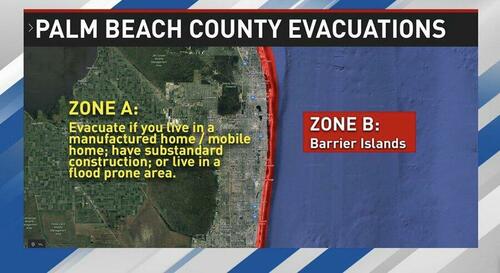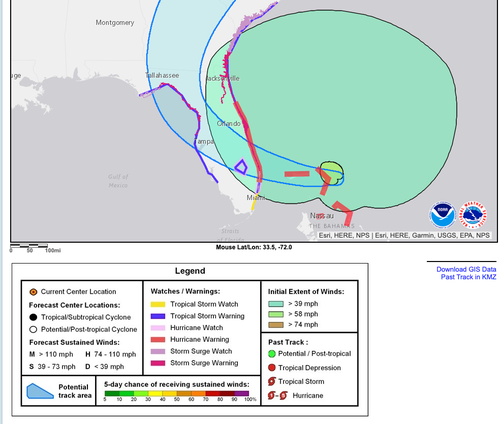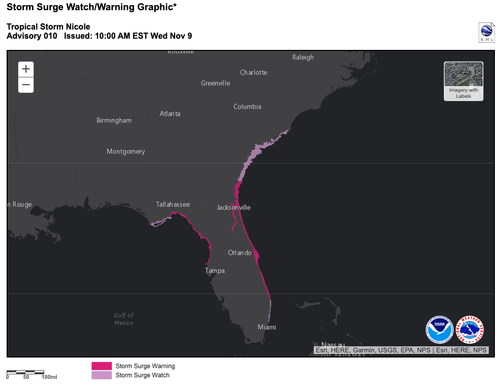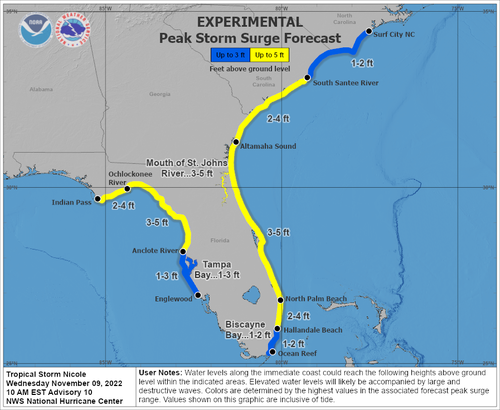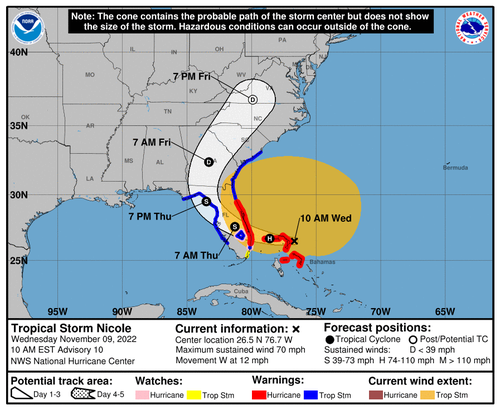
Palm Beach County is under evacuation orders ahead of Tropical Storm Nicole, expected to strengthen into a Category 1 hurricane Wednesday with landfall between Boca Raton and Sebastian late Wednesday night or early Thursday.
Nicole is about 240 miles east of West Palm Beach, Florida, with sustained 70-mph winds just four mph shy of hurricane status.
Palm Beach County officials announced Mandatory Evacuations for Zones A and B. This includes mobile homes, barrier islands, and low-lying areas.
"Nicole would be the first hurricane to make landfall in the United States in November in nearly 40 years," a CNN meteorologist said.
Hurricane warnings are posted from Boca Raton to Daytona Beach, including Palm Beach, Port St. Lucie, and the Space Coast. Tropical storm warnings span up to Charleston, South Carolina, and include much of Florida's East Coast.
Storm surge warnings for Palm Beach are also in effect.
Florida's east coast could experience a peak surge of up to 5 feet of water.
The National Weather Service wrote as "Nicole moves inland across the Florida peninsula," there could be "significant impacts" to building structures, marinas, docks, and piers, as well as roadways and bridges.
Ahead of the storm's landfall, Palm Beach International Airport closed Wednesday morning. Orlando International Airport will cease operations at 1600 ET.
The ominous forecast could be very problematic for NASA. The space agency's $4 billion Space Launch System rocket sits on the launch pad at Kennedy Space Center, where it's expected to ride out the storm.
Launch Update: @NASA is continuing to monitor Tropical Storm Nicole and is re-targeting a launch for the #Artemis I mission for Wednesday, Nov. 16, pending safe conditions for Kennedy workforce to return, as well as inspections after the storm has passed.https://t.co/JgGAAs9RfJ pic.twitter.com/RGNw6Bk55z
— NASA's Kennedy Space Center (@NASAKennedy) November 8, 2022
After hitting Florida's east coast, Nicole will traverse central and northern Florida into southern Georgia Thursday. Then into the Carolinas by Friday.
Palm Beach County is under evacuation orders ahead of Tropical Storm Nicole, expected to strengthen into a Category 1 hurricane Wednesday with landfall between Boca Raton and Sebastian late Wednesday night or early Thursday.
Nicole is about 240 miles east of West Palm Beach, Florida, with sustained 70-mph winds just four mph shy of hurricane status.
Palm Beach County officials announced Mandatory Evacuations for Zones A and B. This includes mobile homes, barrier islands, and low-lying areas.
“Nicole would be the first hurricane to make landfall in the United States in November in nearly 40 years,” a CNN meteorologist said.
Hurricane warnings are posted from Boca Raton to Daytona Beach, including Palm Beach, Port St. Lucie, and the Space Coast. Tropical storm warnings span up to Charleston, South Carolina, and include much of Florida’s East Coast.
Storm surge warnings for Palm Beach are also in effect.
Florida’s east coast could experience a peak surge of up to 5 feet of water.
The National Weather Service wrote as “Nicole moves inland across the Florida peninsula,” there could be “significant impacts” to building structures, marinas, docks, and piers, as well as roadways and bridges.
Ahead of the storm’s landfall, Palm Beach International Airport closed Wednesday morning. Orlando International Airport will cease operations at 1600 ET.
The ominous forecast could be very problematic for NASA. The space agency’s $4 billion Space Launch System rocket sits on the launch pad at Kennedy Space Center, where it’s expected to ride out the storm.
Launch Update: @NASA is continuing to monitor Tropical Storm Nicole and is re-targeting a launch for the #Artemis I mission for Wednesday, Nov. 16, pending safe conditions for Kennedy workforce to return, as well as inspections after the storm has passed.https://t.co/JgGAAs9RfJ pic.twitter.com/RGNw6Bk55z
— NASA’s Kennedy Space Center (@NASAKennedy) November 8, 2022
After hitting Florida’s east coast, Nicole will traverse central and northern Florida into southern Georgia Thursday. Then into the Carolinas by Friday.
